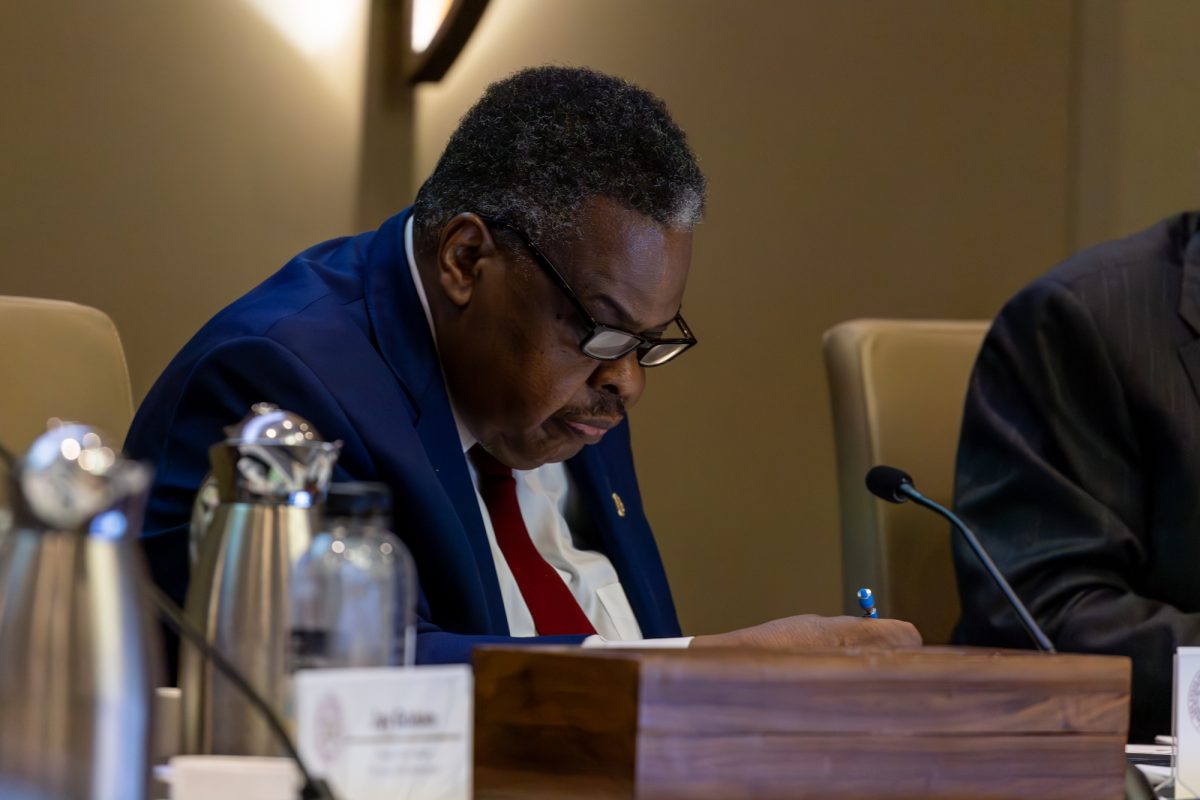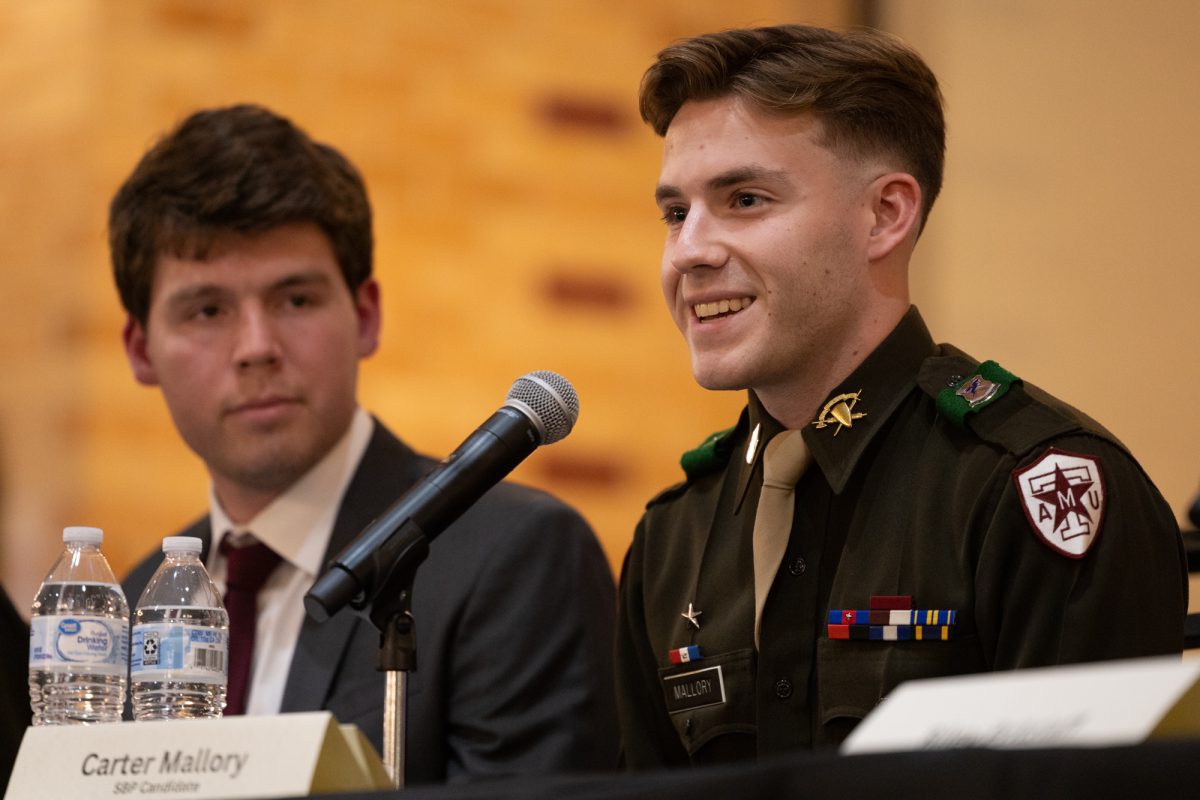A Nov. 15 memo from the Office of the Provost has directed Texas A&M’s colleges and schools to end 52 minors and certificates.
The order follows the Board of Regents’ resolution last month mandating the closures despite opposition from faculty and administrators, including President Mark A. Welsh III. The document states that on Nov. 8, one day after the regents’ resolution passed, Welsh instructed Provost Alan Sams to eliminate the 14 minors and 38 certificates by Jan. 1, 2025.
Sams tasked Timothy P. Scott, vice provost for academic affairs, with carrying it out.
Six actions are to be implemented immediately:
- Students enrolled in the minors and certificates on Nov. 8 complete the programs, but no new enrollments will be allowed in the programs after then. The Office of the Registrar will facilitate the transition.
- The plans for teaching all currently enrolled students alongside other elements required for each cut must be submitted to, approved and finalized by Alicia Dorsey, A&M’s associate vice president for academic effectiveness and planning, before Dec. 16.
- Deans must notify students, staff and faculty of the impacted programs and provide documentation of the communication by Dec. 2.
- The cut minors and certificates will be closed in all university systems by Jan. 1, 2025, and a note will be added to A&M’s catalog indicating each closure.
- The eliminations will be controlled and properly documented by Curricular Services, the university office that assists with developing and implementing courses and programs.
- Documentation must be provided to Scott by Dec. 16 stating all necessary actions have been taken to comply with the regents’ directive.
Angie Hill Price, the senate’s speaker and associate dean for undergraduate programs in the College of Engineering, forwarded the order to Faculty Senate members.
The 52 program cuts — all spurred by June 2023 inquiries into the LGBTQ studies minor — continue a months-long saga that has pit faculty against administrators over concerns that the provost-led process degrades shared governance, the commonly accepted idea that faculty have a say in university decisions. Created with little input, most faculty heard of the new enrollment thresholds when ordered to end their programs in August and September.
THE IDEA’S ORIGIN
The process used to end the programs began development after inquiries into the LGBTQ studies minor in June of last year led to a review of it by the provost’s office. While the exact inquiry remains unknown, Sams said it was a post on the social media platform X.
“We looked at the program, and we looked at the enrollment of that and said, ‘We have a program — why did we create a program if there’s just one student that’s interested enough to declare it?’” Sams said two months ago during a Faculty Senate meeting.
According to an open records request from The Battalion, Sams’s office began developing the process as early as June 20, 2023. That day, Dorsey emailed him spreadsheets listing enrollment numbers for various programs, including minors and certificates. Ten days later, he emailed Dorsey and Joseph Pettibon about the plan. Pettibon, the vice president for planning, assessment and strategy, is one of 19 senior leaders in Welsh’s cabinet.
“Confidentially, we are developing a set of thresholds for enrollment in all programs and if a program falls below that, they will have a year or two to improve before the program is closed,” Sams wrote in the June 30, 2023 email.
Several of the affected programs have zero student enrollments. Of the 53, an A&M spokesperson said there was an average of less than one student enrolled per certificate and roughly 1.2 students enrolled per minor.
By August 2023, Sams began collaborating with the Council of Deans, a group of A&M’s 18 deans who each lead a school or college. Timothy Powers, the provost’s chief of staff, emailed Sams with enrollment spreadsheets ready for distribution to the deans on Aug. 23 last year. Powers noted the spreadsheets were “slightly off” because the numbers were pulled in July, a point he said shouldn’t be shared with the deans.
The thresholds were created by a subcommittee on the council, and while the subcommittee’s exact members remain unknown, a faculty source with firsthand knowledge confirmed it was led by Debbie Thomas, the chief academic officer of A&M at Galveston and dean of the College of Marine Sciences and Maritime Studies.
Sams discussed the inactivations with various deans throughout, including in two documents reviewed by The Battalion: memos he sent to Tim McLaughlin and Nate Sharp. With Sharp, the provost emphasized that the cuts were “agreed upon by the Council of Deans” and “discussed again” at a Sept. 4 Council of Deans meeting, of which both Sharp and McLaughlin are members.
Other statements noted that the initiative was discussed with various department heads and professors. Despite this, faculty were largely uninformed of the thresholds’ implementation. During a sit-down interview with The Battalion, Welsh said the communication issues that led to the faculty’s surprise is something he hopes to improve.
“So anywhere in the university where that is not happening, we have to strengthen it,” Welsh said. “That’s one focus area. And it’s not just from the provost’s office. It’s in the deans’ offices, the department heads’ offices. The Council of Deans was involved in this entire process. How were they communicating with the department heads and the faculty members and the directors of these programs that were actually on the chopping block or proposed for review to be put on the chopping block?”

It’s unclear when the subcommittee finalized the thresholds. However, one article, quoting an A&M spokesperson, wrote that the process was still under development as of Feb. 15. The same article quotes Rep. Brian Harrison — a Republican lawmaker and Class of 2004 graduate — who had begun a media blitz criticizing the LGBTQ studies minor in January. Harrison met with Sams over a Zoom call to discuss the program around that time.
“I asked them to discontinue this minor or provide to me in writing a justification for this minor to be continued,” Harrison said in the article earlier this year.
The lawmaker was joined by Rep. Chip Roy, who told the outlet that A&M needed to be “held accountable” for its “radical woke policies.” In a Battalion article published the following month, Harrison called the minor “liberal indoctrination” and a waste of taxpayer money, deriding Sams’s decision not to cut it.
When pushed about potential cost savings — the original argument for the eliminations — at one senate meeting, Sams said his office attempted but was unsuccessful in calculating a number due to the difficulty involved. Rather, the inactivations are “about focus” because the university aims to “do bigger and better things,” he said.
FACULTY REACT
The cuts affected multiple colleges and disciplines, ranging from aerospace and chemical engineering to Asian studies.
In several appeals, programs made cases for why specific minors or certificates should have been excluded, such as corrosion science and engineering, which substitutes for professional certification in the industry — a necessity that saves students money.
The appeal for the environmental and engineering geology undergraduate certificate was denied despite seven fall 2024 enrollments, up from zero the year before. It became available for students in fall 2022 to accommodate the need for environmental geoscientists, one of the nation’s fastest-growing sectors.
By August and September, the cuts were largely finalized. The provost’s office set a final date of Sept. 20 for each to begin the inactivation process.
However, to the faculty unaware, the order was unprecedented. Historically, curriculum changes — including cuts and additions — originate exclusively at the faculty level.
In the Daily Caller’s article earlier this year, Sams told Harrison nothing could be done about the LGBTQ studies minor because no faculty had requested a change. Now, they were being ordered to cut it.
“The minor barely had a chance to establish itself,” Sally Robinson said. Robinson is the graduate coordinator in the Women’s and Gender Studies program or WGST. “We felt that if the argument was that our enrollment numbers were low, then we really weren’t given a chance to address that. Nobody in the provost’s office contacted any faculty members. Nobody contacted any students, as far as I know. This was something that was just presented to us as a done deal.”
A major faculty criticism revolves around the degradation of shared governance, the idea that faculty have a large say in university proceedings. Many programs facing elimination were new, and no opportunity was provided to increase enrollment. Others were still building foundations, such as the Asian studies minor, which was in the process of hiring faculty to teach classes that would hopefully revitalize the program.
The Battalion first reported on the cuts on Sept. 26, spurring several articles from right-leaning outlets, including the Texas Scorecard, Campus Reform and the Daily Caller, which all focused on the LGBTQ studies elimination and quoted Harrison, who had begun falsely taking credit for the inactivation.
That day, he posted on the social media platform X that he “was pleased to learn from Chancellor [John] Sharp they plan to end it” and that he was “proud to have helped deliver this victory for Texas taxpayers.” An A&M System spokesperson said Sharp relayed the inactivation to the lawmaker after he asked the chancellor about it following the initial story’s publication.
On the faculty side, opposition groups coalesced. When faced with the Sept. 20 deadline, WGST’s director, Theresa Morris, refused to begin the elimination process in the online portal. Per A&M’s Standard Administrative Procedures, the program director must approve the request for it to proceed.
So when an associate dean entered the system and began the process despite her opposition, Morris gathered WGST’s faculty to vote on it. Days later, 30 faculty unanimously voted against inactivation. Morris subsequently left the LGBTQ studies minor pending in the portal, with its cut unable to move forward.
Similar protests occurred in other departments. In the Department of Geology and Geophysics, documents reviewed by The Battalion showed 87.5% of faculty voted to keep the environmental and engineering certificate, and 62.5% voted to retain the petroleum geoscience certificate.
“The Department of Geology and Geophysics has bylaws for major changes to our curricula,” a department representative wrote in the online portal for curriculum changes. “The process consists of discussion and vote of the Department Curriculum Committee, followed by discussion and vote of the full Faculty.”
For the inactivations to succeed, they also must be approved by the Faculty Senate. But faced with the perceived threat to shared governance, senators began voicing their discontent with the process. Price, the senate’s speaker, called it a “deeply flawed” process that “lacked meaningful input from many stakeholders.”
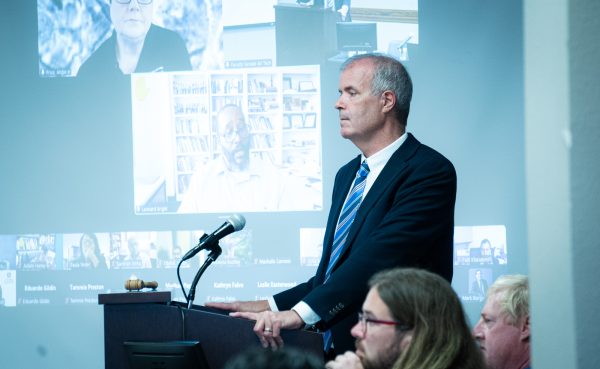
She requested the current thresholds be “completely abandoned” in exchange for a revised process created with Faculty Senate involvement. At the senate meeting two weeks later, Sams, attending to gather feedback, faced frustrated senators who questioned him for almost two hours.
“You’ve been here for 37 years, and can you help me understand why faculty were explicitly left out of this curricular process?” one professor asked him. “You know that faculty are a part of that, sir. Why were we left out of this consultative process?”
Others alleged political interference, connecting Harrison’s comments with the LGBTQ studies minor’s inactivation.
“How are we going to provide a counter-narrative to that and ensure other people who are not part of the shared governance are [not] taking credit for decisions?” another professor asked. “I’m also very concerned for our LGBTQ students and what message this sends to them — that a state representative removed a minor that directly relates to their identity.”
Senators ended the meeting by voting to deny the analytics minor’s inactivation, the first provost-led cut to make it to the senate. Without the group’s approval, the eliminations — and the process — had essentially died.
THE NINE-MEMBER BOARD
Then the Board of Regents stepped in.
The nine-member board oversees the 11 universities under the A&M umbrella and can direct the chancellor and university president, if necessary. On Nov. 1, a draft resolution was uncovered and shared by faculty, and Price distributed it to senators with the message “alert your constituents as soon as possible.”
The resolution, if passed, directed Welsh to “take actions necessary to eliminate” the 52 minors and certificates that had been pending due to senate opposition.
Price and the Faculty Senate’s Executive Committee — its top leaders — decided to take emergency action days before the regents reviewed the resolution. Acting on behalf of the senate, they denied multiple provost-led cuts scheduled to be on the senate’s Nov. 11 agenda days in advance in case the regents attempted to “circumvent the Senate’s ability to vote on these items.”
“The [Executive Committee] is concerned that The Board of Regents may not be fully aware of the deeply flawed process and the ramifications of the Provost’s decisions,” Price wrote in a Nov. 5 announcement detailing the group’s actions. “We do not oppose the concept of a process, but we vehemently oppose the one that was implemented by the Provost with little consideration of the consequences.”
At the Nov. 7 meeting, dozens of students, staff and faculty attended to protest the resolution, with eight faculty criticizing it during a public forum. Allegations of political interference swirled, with one professor — Leonard Bright — stating that allowing “one political ideology group to tilt the educational scales will destroy this great institution of higher education.”
“The provost plan ignored long-standing institutional shared governance norms and bypassed existing curricular committees tasked with such matters in its development,” Andrew Klein, professor and senate speaker elect, said. “ … Most importantly, it seems impossible to escape the conclusion that the entire scheme was engineered to target a specific, controversial minor with many of other programs simply catched as bycatch.”
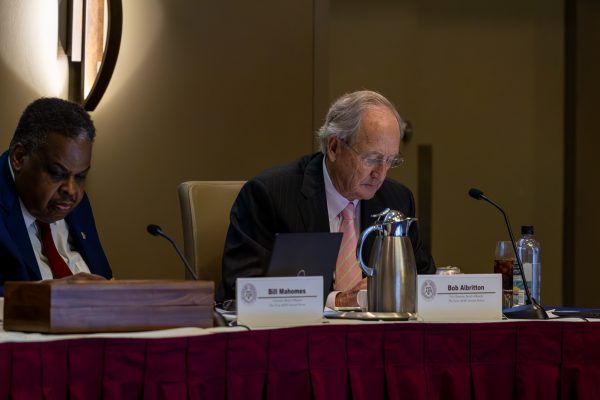
The resolution also states that Welsh recommended the process be halted and overhauled with senate involvement, a note that drew applause when mentioned during the meeting.
“Is [thresholds for low-producing programs] under [Sams’s] authority as the chief academic officer of the university?” Welsh said during his interview with The Battalion. “Absolutely. Does he need somebody’s permission to build it? No. But I think he should have incorporated more people into the discussion of that because there’s a lot of detail that should go into it that the faculty needs to understand. And the Faculty Senate is the collective voice and representative body of the faculty. And that was the mistake.”
But the board disagreed. Regent Bob Albritton, the board’s vice chairman, said the group had a fiduciary responsibility to the A&M System and the state. However, his remarks included incorrect statements that drew jeers from the attending faculty.
“So you can sit and tell us that you’re going to fill these classes up, but all we have to do is look at data, which is the last five years of these classes,” Albritton said.
Minors and certificates — not classes — were impacted by the resolution, and the provost’s proposal used data from the last three years, not five.
Regent Michael Plank said despite a “failure along the way to carry this fully through the Faculty Senate,” the board nonetheless believed sufficient faculty involvement had occurred.
“At the end of the day, we truly feel obligated to eliminate the waste,” Plank said.
The board then unanimously approved the resolution.
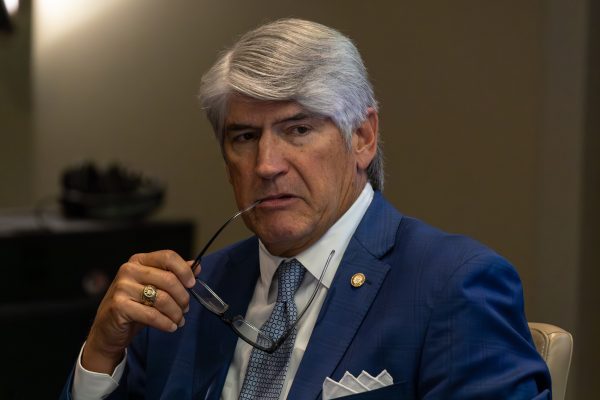
The regents’ involvement in the university’s curriculum is largely unprecedented. Price told The Battalion she had seen nothing like it in her roughly 30 years at A&M. After the meeting, Morris, WGST’s director, said the regents “ultimately decided not to listen to faculty concerns.”
During the interview, Welsh emphasized the hierarchy at the university and the A&M System. He said his job is to be “clear and straightforward in [his] recommendations to them,” but ultimately, the regents remain his superiors.
“We’re executing the decision of the Board of Regents,” Welsh said. “Their decision was very clear. Whether any individuals — me or anyone else here — agrees or disagrees with it, their decision is pretty clear. They absolutely have the authority to make that decision if they choose to insert themselves into that discussion. And you would have to ask them why.”
On social media, the board’s action drew praise from Republican lawmakers statewide. Abbot called it “very good news,” and State Sen. Brandon Creighton, the chair of the Texas Senate’s higher education subcommittee, said “more bold reforms” are coming for universities.
State Sen. Paul Bettencourt said in a now-deleted post that the regents’ order was the correct move, and now that Texas’s anti-DEI bill is in effect, A&M has no basis for maintaining the programs, “much less a LGBTQ one.”
THE AFTERMATH
Days later, the Faculty Senate meeting saw senators facing a new reality.
“If the Board of Regents is now in charge of curricular instruction in the university, then what is the purpose of the faculty?” one professor asked.
Others shared similar complaints, such as Price, who emphasized that the process was “poorly planned” and “poorly developed.”
“We serve as a sounding board for the president on any initiatives for the university,” Price said at the meeting. “That is shared governance. … The university’s foundation is its faculty. Therein lies the knowledge, the commitment to learning and the source of constructive progress in which the university rests.”
According to A&M’s curriculum change portal, dozens of programs have moved into the final stages of inactivation. Usually, minors and certificates must undergo roughly 13 checks and approvals from various groups before the official elimination. After the memo, those checks — including Faculty Senate and provost approval — were removed, down to two in some instances: review and approval from curricular services.
Politically, conservatives have hailed the move as a Republican victory. Harrison soon began criticizing various courses at A&M, such as WGST 333: Lesbian, Gay, Bisexual, Transgender and Queer Literatures. On X, he claimed ending the minor was “just the start” and proposed reducing the budget of any university president’s office to zero if they allow “taxpayer-funded leftist propaganda on their campus.”
He then went after the University of North Texas for its LGBTQ minor. And when the University of Texas announced free tuition for families earning under $100,000 annually, he and 10 other representatives criticized it in an official letter, asking if their “constituents’ hard-earned tax dollars” would go to students in the LGBTQ/Sexualities Studies minor.
Yet at A&M, the costs saved remain unknown. In one senate meeting, one faculty suggested the time creating a minor — a few hours of work — amounted to a one-time cost of a few hundred dollars with no upkeep. Officially, the Board of Regents’ resolution was to save taxpayer funds. But some faculty said they doubt that. One faculty, who requested anonymity to speak freely, alleged the resolution was “politically motivated.”
After months of discord, the 52 minors and cuts have been eliminated at A&M. From Welsh’s perspective, the situation is over. But he said people who claim they’re losing trust because his administration isn’t listening to faculty are “not looking at facts, very clear facts.”
“I have made literally hundreds of decisions on various things that affect the campus, even on this one,” Welsh said. “In every single one of them, I believe I favored the faculty position. So people telling me that they lose trust because we’re not listening to the faculty don’t know what they’re talking about.”















